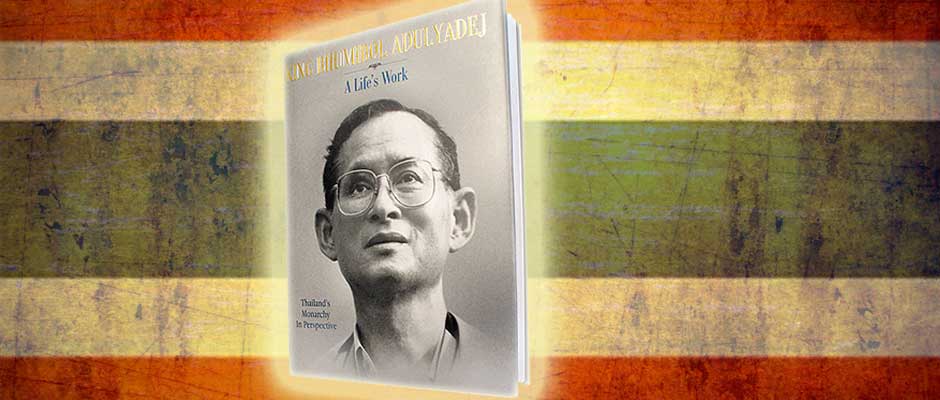Nicholas Grossman and Dominic Faulder (eds.). 2011.
King Bhumibol Adulyadej, A Life’s Work: Thailand’s Monarchy in Perspective.
Singapore: Editions Didier Millet. 383 pages.
In 2008, when it had become impossible for any credible journalist to ignore the entanglement of the palace in Thailand’s unfolding tragedy, I wrote an analysis on Thailand’s King Bhumibol Adulyadej for Reuters. A conference call was convened with top managers plus a Thai lawyer hired to provide legal advice on what could safely be published. For almost an hour we discussed the article, with the lawyer rejecting every point as too risky. “So what can I say?” I eventually asked.
Welcome to the parallel universe of 21st century Thailand. Any rational observer can see the King is dying and the monarchy is in crisis, but saying so is illegal. Instead of acknowledging reality and accepting the need to evolve, royalists are retreating deeper into a fantasy world and demanding that everybody else believe their delusions too. A leaked U.S. cable from 2009 quotes a leading American businessman in Thailand who tried — and failed — to explain to royalist contacts that criminalizing debate would harm the monarchy. As he concluded, “These people live in an alternate reality.”
There is a desperate need for Thailand’s more reasonable royalists to step up and restore some sanity to the situation. The international media also has a crucial role to play, because if they collectively resolve to report the reality of what is happening without undue deference to the ridiculous strictures of the lèse-majesté law, its enforcement will no longer be sustainable and sensible debate can begin.
So when news emerged that several longtime foreign journalists in Thailand were collaborating with the more moderate members of Bhumibol’s inner circle on a major semi-official book on the King, it seemed to offer hope that royalism could be reclaimed from the extremists. King Bhumibol Adulyadej, A Life’s Work was overseen by an editorial board chaired by former Prime Minister Anand Panyarachun, working with highly regarded academics—David Streckfuss, Porphant Ouyyanont and Chris Baker— and journalists with years of experience in Thailand—Nicholas Grossman, Dominic Faulder, Julian Gearing, Paul Wedel, Richard Ehrlich, Robert Horn, Joe Cummings and Robert Woodrow. All are well-known members of the Foreign Correspondents’ Club of Thailand (FCCT), which claims to advocate press freedom and open exchange of information. Launching the book at the FCCT in November 2011, Anand declared:
[quote]We talk about both sides relating to the monarchy. We are not hiding the truth, or running away from debates… The book features accurate information, which is fair to all sides, and is regarded as a reference for anyone without true knowledge about the monarchy.[/quote]These were stunning claims. Unfortunately they proved totally dishonest. The depressing conclusion to be drawn from this publication is that sanity is in short supply even among moderate royalists, and foreign journalists lack the courage to help Thailand face reality. The most important thing to understand when assessing any book about Bhumibol is that — as Anand and every journalist and academic who worked on the project must be fully aware — it is impossible to write a credible factual account of the King’s reign without broaching some of the most taboo subjects in Thailand’s modern history and radically reappraising what can be legally said about the monarchy. Nobody expects a royal hagiography to be a warts-and-all exposé that reveals every skeleton in the palace closets, but Anand insisted this book would be an accurate narrative, and the involvement of a vast team of foreign scholars and journalists was touted as proof. Instead, all we get is a fairytale.
A Life’s Work’s most glaring departure from reality is the unsustainable claim that the King has never interfered in politics apart from two famous occasions, 1973 and 1992, when he stepped in to halt military massacres and restore democracy. In fact, the palace has meddled incessantly ever since the 1970s, as Paul Handley’s brilliant 2006 biography The King Never Smiles demonstrates beyond doubt. The monarchy was intimately involved in events leading up to the appalling massacre of students at Thammasat University in October 1976 and the authoritarian era that followed. From the 1980s, the palace used General Prem Tinsulanonda as its political proxy, first as prime minister and then head of the Privy Council. And since 2005, the royalist establishment has been actively seeking to crush Thaksin Shinawatra, the most popular politician in Thai history, with disastrous consequences.
There can be legitimate disagreement on whether the net impact of palace’s political activism has been beneficial or damaging. But instead of acknowledging Bhumibol’s interventions and trying to make the case that they positively influenced the course of history, this book pretends they never happened at all. It claims that in 1976 and afterwards Bhumibol “kept himself well apart from the perilous entanglements of politics” (page 137). It dismisses the issue of palace involvement in the 2006 coup with a quote from Chulalongkorn University professor Suchit Bunbongkarn on page 178:
[quote]I would say the King did not have anything to do with the coup. It turned out to be a disaster for the palace.[/quote]In fact, Bhumibol could easily have halted the coup by ordering the royalist generals to stand down as they rolled their tanks into Bangkok. He chose not to.
A Life’s Work’s handling of the death of King Ananda Mahidol, Bhumibol’s elder brother, in 1946 is particularly distasteful. Officially, Ananda’s death was blamed on a communist conspiracy masterminded by Siam’s senior statesman, Pridi Banomyong, who was forced to flee the country and died in exile in 1983. It is understandable that this book would avoid confronting the true story, but it contains disgraceful innuendos reviving the discredited claim Pridi was responsible. On page 86 it states:
For Pridi Banomyong, the coup and accusations against him after King Ananda’s death were the final blows to his political career. As the wartime regent and incumbent prime minister, he had at the very least failed to keep King Ananda safe.
On page 87, it stokes suspicions by asserting:
Many did not believe Pridi had played any role in King Ananda’s death, but after the 1949 failed coup, he never came home and offered no explanation himself beyond saying he did not know who was responsible.
For these statements to be made in 2011 in a book claiming to be a serious scholarly work is shameful.
The stylistic deficiencies at least provide comic relief from the depressing spectacle of well-known foreign journalists obligingly spouting palace propaganda. A Life’s Work is packed with breathlessly fawning prose better suited to Hello! magazine than a serious academic work. My favourite phrase comes on page 88, when Bhumibol meets Sirikit:
Love came knocking at his door in the shape of a cousin…
Amid the fairytales and dross, there are a few worthwhile chapters. The sections on lèse-majesté by Streckfuss and the Crown Property Bureau by Porphant are genuinely useful, but both are watered-down distillations of work they produced elsewhere. Furthermore, the chapter on lèse-majesté repeats the common but spurious claim that Bhumibol’s 2005 birthday speech signaled his support for reform of lèse-majesté law.
If Bhumibol really wanted the authorities to adopt a saner approach, he could surely make this happen. But as A Life’s Work inadvertently demonstrates, the King and his acolytes have become so lost in their fairytale world that it is simply too late for them to turn back. Abandoning lèse-majesté law would force them to acknowledge unpalatable truths about the failure of the palace to stay above politics, the divisions over the succession, and the tragic stories of 1946 and 1976. They fear that allowing the truth about these issues to emerge would destroy the monarchy. They may well be right.
It’s understandable why Bhumibol’s inner circle would try to defend his crumbling reputation. It is less justifiable for foreign journalists to allow themselves to be used so crudely to give spurious legitimacy to palace propaganda. Reporting on Thailand is difficult and dangerous, but a basic principle of ethical journalism is that if you cannot safely tell the truth, at least acknowledge that you cannot, and explain why. Never, ever lie.
Perhaps the saddest thing about A Life’s Work is that it’s pointless. When Bhumibol passes away, the foreign media will inevitably start reporting the truths they avoided while he was alive. The stories the royalists tried so hard to suppress will come out in the end. You cannot run forever from reality.
Reviewed by Andrew MacGregor Marshall
http://www.zenjournalist.com/
Kyoto Review of Southeast Asia. Issue 13 (March 2013). Monarchies in Southeast Asia

